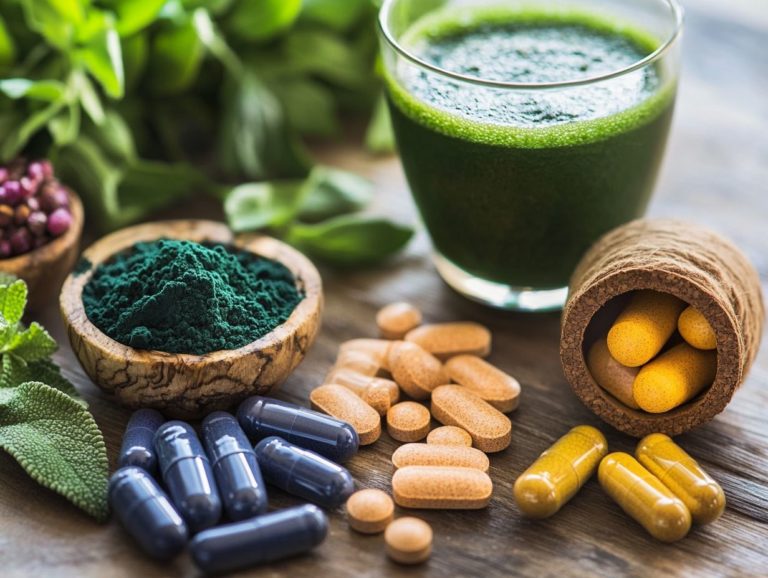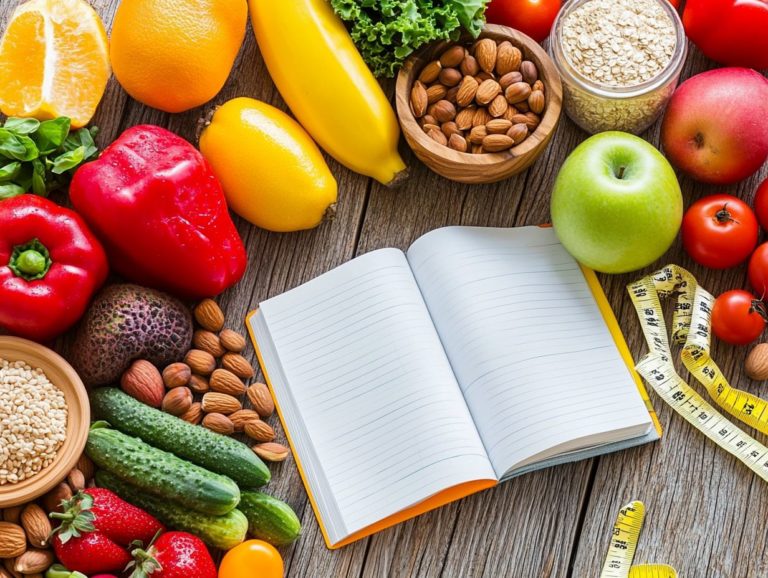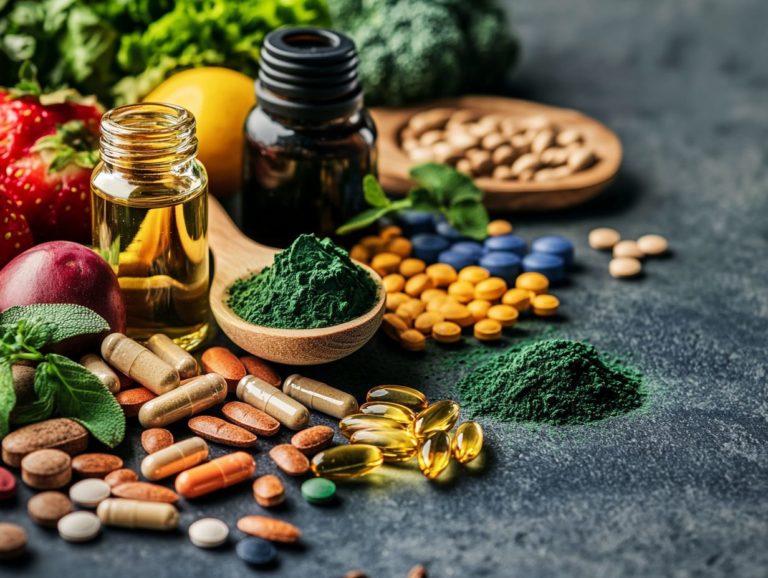What Are the Best Practices for Post-Workout Nutrition?
After a rigorous workout, the choices you make regarding your nutrition can profoundly impact your recovery, performance, and overall fitness aspirations.
Post-workout nutrition is key for replenishing energy, repairing muscles, and optimizing your gains. This article explores the critical components of post-workout meals, covering the ideal macronutrient ratios, timing, and specific foods that foster recovery.
You will also learn how to craft a personalized nutrition plan designed specifically for your needs. Prepare to maximize your workout achievements!
Contents
- Key Takeaways:
- The Importance of Post-Workout Nutrition
- Macronutrient Breakdown for Post-Workout Meals
- Timing of Post-Workout Nutrition
- Specific Foods for Post-Workout Nutrition
- Supplements for Post-Workout Nutrition
- Hydration After a Workout
- Creating a Personalized Post-Workout Nutrition Plan
- Frequently Asked Questions
- What Are the Best Practices for Post-Workout Nutrition?
- What should I eat after a workout?
- How soon after a workout should I eat?
- Do I need to eat more after a strenuous workout?
- Is it necessary to take supplements after a workout?
- Should I eat differently after a cardio workout vs. a strength training workout?
- Can I eat a cheat meal after a workout?
Key Takeaways:
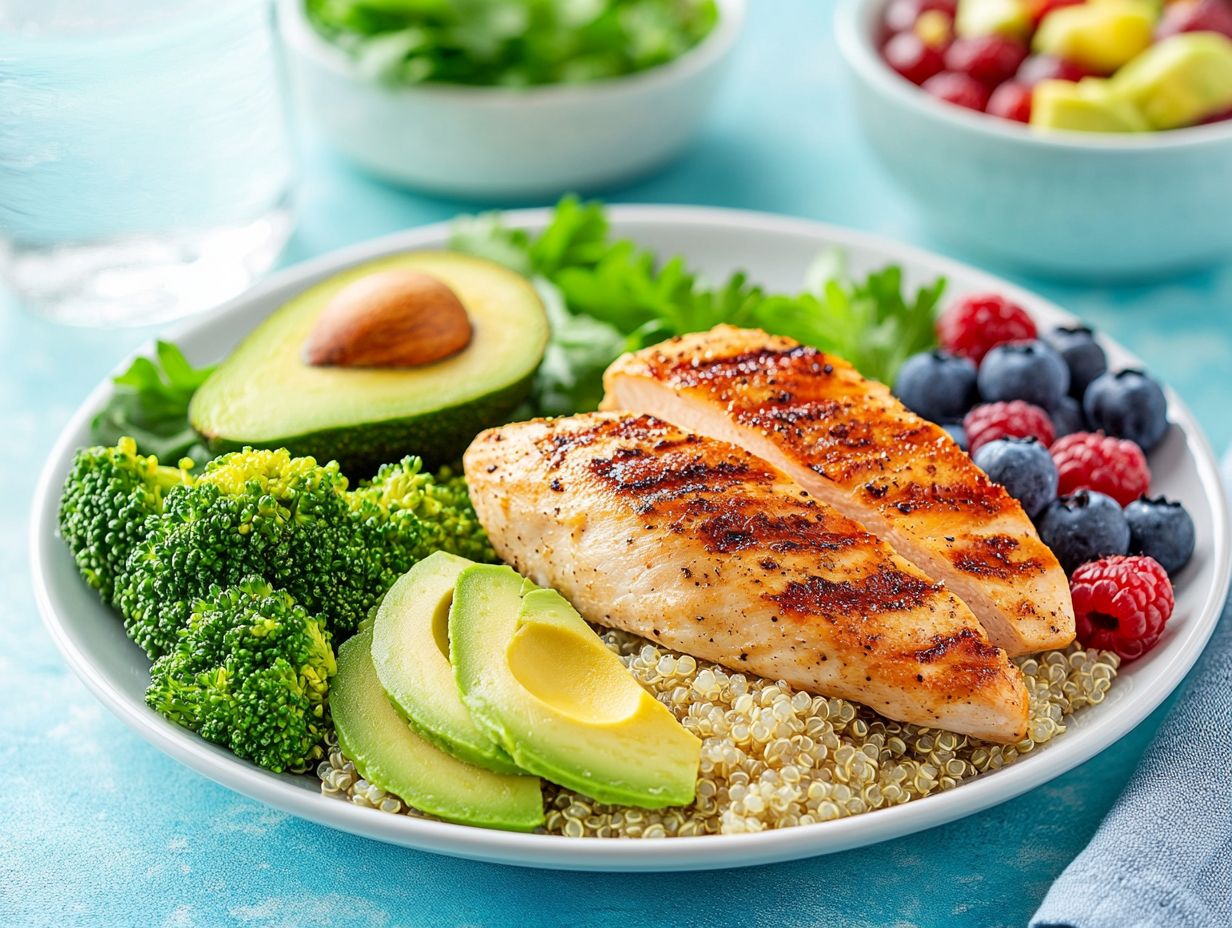
- Eating the right post-workout meal can greatly impact muscle recovery and growth.
- A balanced ratio of protein, carbohydrates, and fats is essential for optimal post-workout nutrition.
- Replenishing fluids and incorporating specific foods and supplements can enhance post-workout recovery and performance.
The Importance of Post-Workout Nutrition
Post-workout nutrition is key for optimizing your recovery and performance, whether you’re an athlete or a fitness enthusiast.
After an intense workout, your body experiences low energy stores, making it vital to consume the right mix of protein, healthy fats, and carbohydrates. This combination aids muscle repair and helps maintain your energy levels.
A thoughtfully crafted post-workout meal or snack can significantly boost your recovery and elevate your workout results. It also prepares your body to tackle future training sessions with confidence.
Why What You Eat After a Workout Matters
What you choose to eat after a workout holds great significance, profoundly influencing protein synthesis and overall recovery. Opting for the right nutrients especially a harmonious blend of whole carbohydrates and protein can elevate your insulin response, facilitating quicker muscle repair.
This physiological journey begins when protein breaks down into amino acids, which are then used to repair and build muscle tissues. Carbohydrates are equally crucial during this recovery phase, serving as your primary energy source.
Whole carbohydrates, in contrast to their refined counterparts, release glucose at a steady pace. This ensures a smoother insulin response that helps maintain energy levels.
This gradual insulin rise not only aids in restoring muscle glycogen but also enhances the uptake of amino acids into the muscles. By grasping the relationship between these nutrients, you can fine-tune your post-workout nutrition and optimize your athletic performance.
Macronutrient Breakdown for Post-Workout Meals
Understanding the macronutrient breakdown for your post-workout meals is crucial for effective recovery and optimal performance. A well-balanced meal after your workout should include protein, carbohydrates, and healthy fats, each serving a specific purpose in muscle repair and replenishing your energy stores.
The proportions of these nutrients can vary depending on your individual goals whether you’re aiming for muscle gain, weight loss, or enhancing athletic performance. This underscores the significance of meal frequency and choosing the right sources of fat to support your objectives.
Protein, Carbohydrates, and Fat Ratios
The ratios of protein, carbohydrates, and healthy fats in your post-workout meal play a crucial role in your recovery and long-term performance.
Striking an optimal balance is usually a 3:1 ratio of carbohydrates to protein. This ensures your body has the necessary amino acids for muscle repair while efficiently replenishing glycogen stores, the energy stored in your muscles.
If you’re focused on muscle gain, elevate your protein intake to about 25-30% of your total calories. Increase carbohydrates to fuel those intense training sessions.
If you’re aiming to lose fat, a slightly higher protein ratio of around 30-35% may be beneficial. This helps you maintain muscle mass as you shed weight.
Some effective meal combinations to consider include:
- Enjoy grilled chicken with quinoa and sweet potatoes for muscle gain.
- Try a spinach and chickpea salad topped with a lean protein source like salmon if you’re looking to shed fat.
Timing of Post-Workout Nutrition
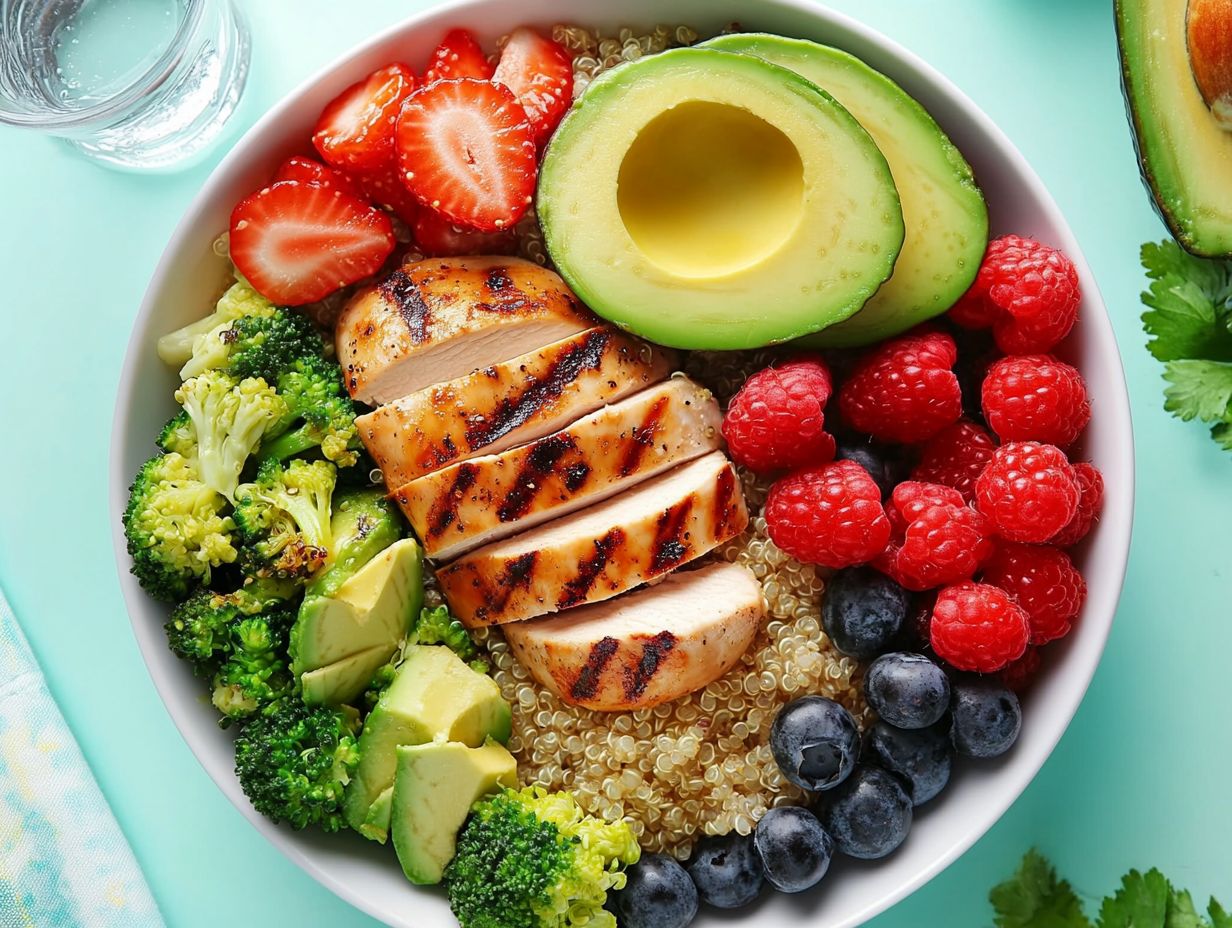
Timing your post-workout nutrition is essential for optimizing recovery and performance.
By consuming a meal or snack rich in protein and carbohydrates within 30 to 60 minutes after your workout, you can significantly enhance muscle recovery, replenish glycogen stores, and support your hydration strategies, which are vital in sports nutrition.
Optimal Time to Eat After a Workout
The optimal time to eat after a workout is often described as the recovery window, typically within the first hour post-exercise.
During this period, your body is primed for nutrient absorption, enhancing insulin response. This is essential for nutrient uptake and improving recovery after demanding workouts.
This timeframe is crucial because it coincides with your body s increased sensitivity to insulin. This promotes glycogen replenishment and protein synthesis vital for muscle repair.
As cortisol levels drop following physical exertion, this recovery window becomes even more significant.
Focus on a balanced intake of carbohydrates and protein, as these nutrients greatly influence your muscle recovery and overall performance.
By prioritizing your meal timing and making informed dietary choices, you can effectively support your physiological processes. This ensures your body is adequately nourished to rebound and prepare for future training sessions.
Specific Foods for Post-Workout Nutrition
Specific foods are essential in your post-workout nutrition, offering crucial nutrients for muscle recovery and growth.
Incorporate protein-rich options like chicken, fish, or plant-based alternatives alongside carbohydrate sources such as sweet potatoes or whole grains. This can craft potent post-workout meals that enhance your recovery.
Recommended Foods for Muscle Recovery and Growth
For optimal muscle recovery and growth, you definitely want to include a variety of protein sources, carbohydrate sources, and healthy fats in your diet.
Think about foods like grilled chicken or fish for protein, while whole grains and sweet potatoes serve as excellent sources of complex carbohydrates.
Don t forget to add healthy fats like peanut butter to enhance your meal s nutritional profile.
These combinations do more than just replenish lost glycogen stores post-exercise; they also supply the necessary amino acids your muscles need for repair.
For instance, pairing a quinoa salad with black beans maximizes your protein intake while offering fiber and magnesium, both of which support muscle function.
Alternatively, a smoothie crafted with Greek yogurt and banana is not only delicious but also provides a quick and digestible source of protein along with natural sugars to help restore your energy levels.
Including leafy greens such as spinach offers essential vitamins that facilitate recovery and reduce inflammation, further enhancing your performance for the next workout.
Try these meal combinations and strategies right after your workouts for optimal benefits!
Supplements for Post-Workout Nutrition
Supplements can elevate your post-workout nutrition. They help optimize recovery and promote muscle growth.
Incorporate protein powders, branched-chain amino acids (BCAAs), and hydration products into your routine. These choices swiftly replenish lost nutrients and support muscle repair.
Enhancing Recovery with Supplements

To enhance recovery, consider protein powder and BCAAs. These supplements provide essential nutrients to speed up recovery and support hydration.
Take protein powder within 30 minutes post-exercise, ideally at a dose of 20-30 grams. Pair that with BCAAs at approximately 5-10 grams to help reduce muscle soreness and recover faster.
Proper hydration is crucial to maximizing these benefits. Drink water or a sports drink with electrolytes to replenish lost fluids and keep your body primed for your next workout.
Hydration After a Workout
Hydration after a workout is essential for recovery. Effective hydration strategies replenish the fluids and electrolytes lost during exercise.
This practice helps prevent fatigue and supports your recovery.
The Importance of Replenishing Fluids
Replenishing fluids after a workout is vital for recovery. Staying hydrated allows your body to function optimally and reduces the risk of cramps and fatigue.
Proper fluid intake also supports your cardiovascular health. Dehydration can decrease blood volume, affecting endurance and performance.
Explore various hydration methods, such as sports drinks that combine carbohydrates and electrolytes, refreshing water, and natural options like coconut water. Determine which option fits your needs best.
Monitor your fluid loss through sweat. Consider using electrolyte tablets to enhance recovery and ensure peak performance in every session.
Creating a Personalized Post-Workout Nutrition Plan
Crafting a personalized post-workout nutrition plan is vital for achieving your recovery goals. Tailor your nutrition to match your workout intensity and specific recovery objectives.
This approach improves results and ensures your body receives the essential nutrients it needs for effective recovery.
Tips for Finding What Works for You
Finding the right post-workout nutrition involves experimenting with different meals. Pay attention to how your body reacts.
Keep a log of your meals to see which combinations boost your energy and speed up recovery. Test various carbohydrates and proteins after workouts, whether it’s within 30 minutes or up to two hours.
Monitor your hydration and meal sizes; these factors significantly impact your performance. Adjusting these elements will help you create a personalized nutrition strategy that aligns with your fitness goals.
Frequently Asked Questions
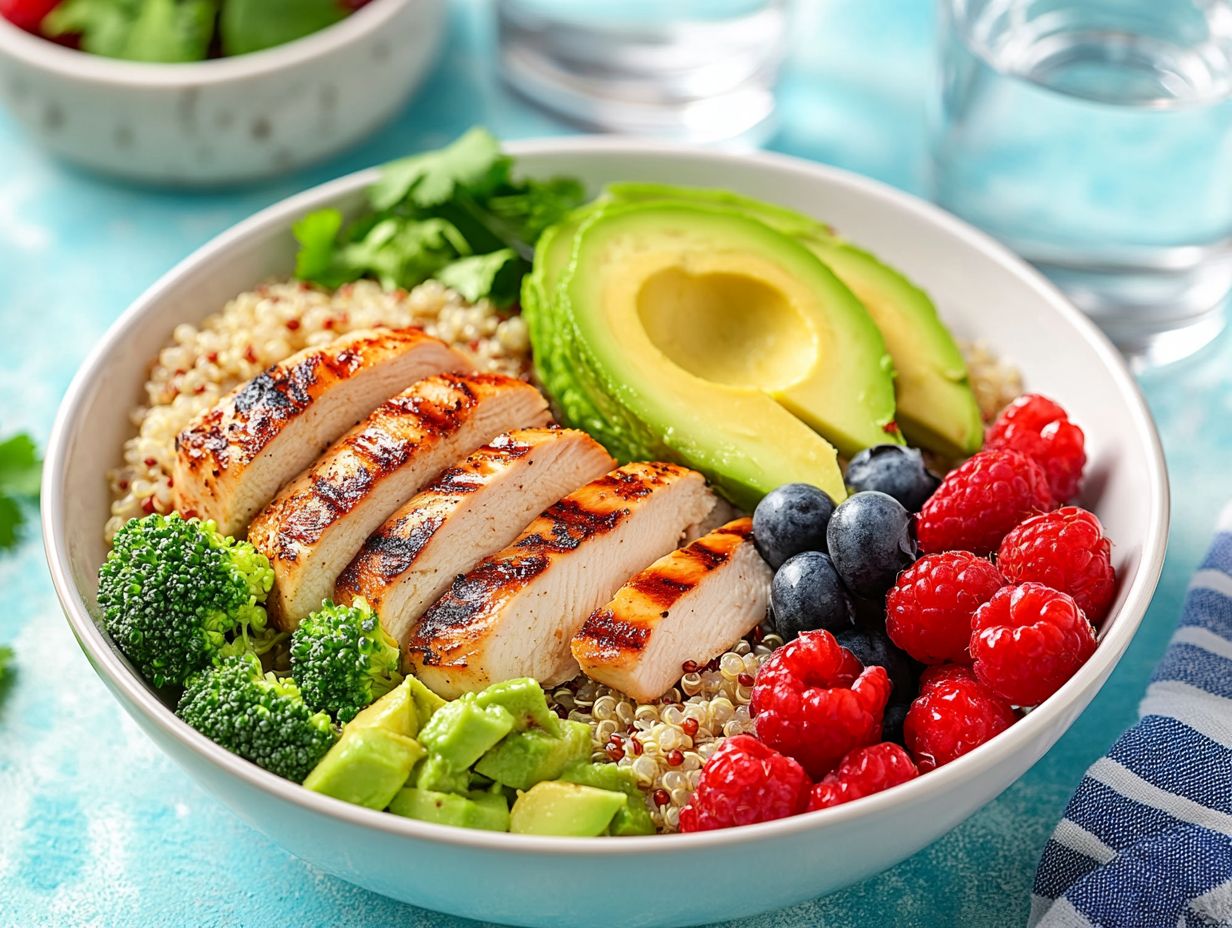
What Are the Best Practices for Post-Workout Nutrition?
Post-workout nutrition is an important aspect of any fitness routine. Here are six frequently asked questions about the best practices for post-workout nutrition.
What should I eat after a workout?
The ideal post-workout meal should include a combination of protein and carbohydrates to help repair and replenish muscles. Good options include a protein shake, Greek yogurt with fruit, or a turkey and avocado sandwich on whole grain bread.
How soon after a workout should I eat?
It’s best to eat within 30 minutes to an hour after your workout to maximize the benefits of post-workout nutrition. Don t wait to refuel; your muscles need nutrients within that crucial window after your workout!
Do I need to eat more after a strenuous workout?
If you’ve completed a particularly intense or long workout, make sure to replenish your energy reserves by consuming more carbohydrates than you would after a regular workout. This will help with muscle recovery and prevent fatigue.
Is it necessary to take supplements after a workout?
Supplements can be beneficial for some, but they aren’t necessary for everyone. A well-balanced diet with proper post-workout meals should provide enough nutrients for muscle recovery. It’s always best to consult with a healthcare professional before starting any new supplements.
Should I eat differently after a cardio workout vs. a strength training workout?
The type of exercise you do can influence your post-workout nutrition. After a cardio workout, focus on replenishing your energy reserves with carbohydrates and adding in some protein for muscle repair. After strength training, prioritize protein intake to support muscle growth and recovery.
Can I eat a cheat meal after a workout?
Indulging in a cheat meal occasionally is okay, but don t make it a habit after workouts. Your body needs proper nutrients to repair and recover, and a cheat meal may not provide the necessary vitamins and minerals. Stick to nutritious meals to get the most out of your post-workout nutrition.




